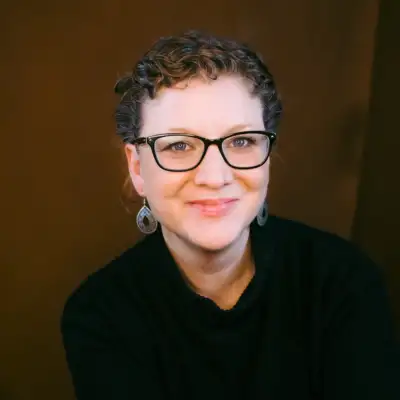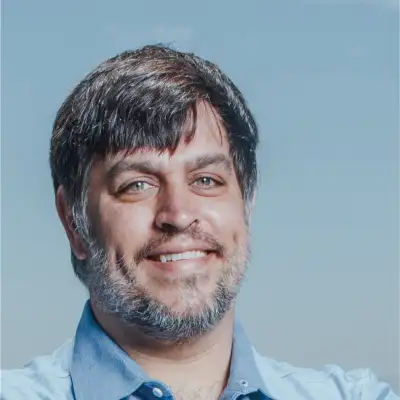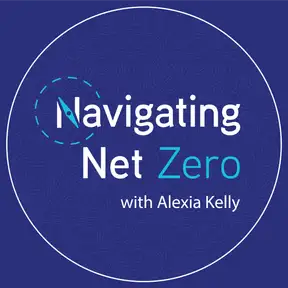Navigating Net Zero: Peter Freed on Clean Energy Strategy & Principled Pragmatism
Navigating Net Zero | Episode 6
(transcript–condensed and edited for clarity and ease of reading)
Guest: Peter Freed
Host: Alexia Kelly
Alexia Kelly:
Well, good morning, afternoon, or evening, and welcome to our next episode of Navigating Net Zero, where we talk about what’s working, what’s not, and what’s next as we collectively navigate this path.
I’m delighted to be joined today by one of my clean-energy and climate-strategy heroes, Peter Freed — a veteran strategist who’s spent more than two decades shaping the future of the grid and corporate clean energy.
From leading energy strategy at Meta to advising companies and investors through his firm, Near Horizon Group, he’s driving innovation and accelerating the transition to a clean, reliable energy system.
Peter, I’m so glad to have you here today and excited to nerd out on all things energy and transition.
Peter Freed:
Hi — that makes two of us. I’m delighted to be here. You’re one of my favorite people to talk about this stuff with, so let’s do it. I’m jazzed.
Alexia Kelly:
Thanks so much for joining. Let’s start with your background. Tell me a bit about your work helping big companies decarbonize their operations, and how that landscape has changed from when you started 15 or 20 years ago to where we are today.
Peter Freed:
These days I mostly talk about my Meta experience, but since you and I go way back, I’ll start even earlier because it’s relevant.
I worked at a company called TerraPass — some listeners might remember it as one of the first retail carbon-offset providers around 2006 or 2007. Back then, corporate sustainability and personal environmental responsibility were having a real cultural moment, and several companies sprang up around that.
I started at TerraPass developing carbon-offset projects, so I developed a deep appreciation for what goes into emissions-reduction projects and the trade-offs involved.
Later, I helped build a consulting business focused on helping companies bring renewable energy into their operations.
When I joined Meta in 2014, it was the early days of corporate renewable energy. Over ten years there, whether I was working on data centers or advanced energy projects, sustainability ran through everything — it drove the decisions we made on the ground.
My perspective has always been practical: if a company wants to do more on sustainability, how can it do that? What tools make sense? What’s efficient and impactful?
At heart, I’m a pragmatic environmentalist — trying to achieve the greatest impact possible given real-world constraints.
Alexia Kelly:
Absolutely. And given your background, I want to dig into greenhouse-gas accounting, because for years it was a niche debate among a small group of “carbon nerds,” but now the accounting rules themselves shape corporate investments.
In a voluntary context, what you’re allowed to count drives action. So — how did greenhouse-gas accounting rules influence Meta’s investment decisions?
Peter Freed:
If you look back, 2011 was the first big year for corporate renewable-energy procurement. Walmart made an early purchase; Facebook (now Meta) set the first 100 percent renewable-energy commitment — not time-bound, just aspirational.
For a long time, most companies focused on volumetric matching through standards like RE100: matching as many megawatt-hours of renewable generation as electricity consumed annually.
Meta’s trajectory was 25 percent, then 50 percent, then 100 percent by 2020. Google hit 100 percent in 2018 and pushed further.
Back then, few people translated megawatt-hours into tons of CO₂. But that was fine because renewables were so scarce that any new project displaced significant emissions. Adding renewables anywhere had real impact.
Now, thanks to our own success, in some places and hours of the day, adding more solar or wind barely moves the needle. So we need to evolve from “renewables for renewables’ sake” toward measuring tons of CO₂ reduced or removed.
By around 2018–2020, a small group of companies began asking, “What’s next? How do we evolve?” But hitting 100 percent renewables was already incredibly hard. Most companies were still working toward that when the conversation about tons began.
Alexia Kelly:
Let’s talk about targets. Voluntary, aspirational targets have clearly helped drive ambition. But companies now worry about setting goals they can’t meet — especially given the headlines when targets are missed.
Should companies still set stretch goals, or lower the bar to avoid backlash?
Peter Freed:
Great question — and it goes to the heart of what voluntary markets are for.
If we go back to those TerraPass years — 2007 or 2008 — there was a burst of corporate activity, often for brand value. That was also the peak “greenwashing” era.
Today, I actually think there’s far less greenwashing — not because everyone suddenly became virtuous, but because consumers just don’t care as much.
After that early hype faded, the companies left standing were the ones that genuinely cared. Their sustainability teams moved from marketing to operations — a good sign.
They set targets they believed they could hit and cared more about environmental substance than splashy headlines.
Then between 2015 and 2020, things accelerated again — charismatic CEOs like Steve Jobs or Larry Page pushed their companies to lead. Ambition spread across tech and beyond.
By 2020, “net zero” entered the picture. Now companies weren’t just addressing Scope 2 (electricity) but also Scope 1 (direct) and Scope 3 (value-chain) emissions — much more complex.
Thousands of companies signed up with SBTi, but only a handful had real strategies. Even those recognized massive gaps — tools simply didn’t exist to meet those targets.
So we had another surge — reminiscent of 2007 — where ambition outpaced capability. And unlike the early days, today’s political and cultural climate is tougher.
These are voluntary commitments; there’s no legal compulsion. Many companies act mainly for peer alignment or PR value. When that erodes, commitment durability becomes a real concern.
Alexia Kelly:
Exactly. And while the economics of renewables have improved dramatically, the politics are harder. Let’s talk about that “green premium” — how the economics of renewables have changed and what that means for keeping companies engaged.
Peter Freed:
Around 2018 was the peak of corporate procurement — a wonderful time to be a buyer. Projects needed offtakers; companies provided something critical: credit. Not just money — bankable credit that made projects financeable.
Project developers typically don’t have the cash to build outright, so they rely on project finance — outside equity and debt backed by long-term offtake contracts. Lenders want assurance that someone reliable will buy the electricity at a fixed price for 12–15 years.
A tech company with strong credit is perfect for that.
That creditworthiness — more than price — is what gets projects built. Utilities once played that role through state renewable-portfolio standards. When those mandates plateaued, corporate buyers filled the gap.
So voluntary buyers have been essential to keeping new projects moving.
Technology costs kept dropping through 2018, but by 2022 supply constraints flipped the market to a seller’s market. Prices rose — not because solar or batteries got costlier, but because of tariffs, supply-chain issues, and surging demand.
Now add today’s political headwinds: new barriers to permitting and development, especially for wind. We’re removing tools from the toolbox just when we need all of them.
Alexia Kelly:
And those long-term offtake contracts you mentioned — that credit — can be catalytic in other sectors too, like EV trucking or clean-tech supply chains.
Before we leave energy markets, let’s talk about international contexts. Corporate voluntary procurement transformed U.S. and EU grids, but that’s not true everywhere.
You mentioned Vietnam earlier — how did Meta think about international markets and market-building?
Peter Freed:
Vietnam is a great example. Until recently, companies there couldn’t sign direct offtake deals unless generation was on-site. It took about a decade of policy work to change that.
Meta — and other multinationals — wanted the ability to do direct procurement abroad, mirroring the U.S. model.
But I sometimes ask a provocative question: from a pure-impact perspective, would it have been more efficient to just fund the government’s feed-in-tariff program to expand renewables directly?
Companies couldn’t easily “claim” those tons, so that idea never took off, but it illustrates an important point: maybe sometimes the highest-impact path isn’t the one that maximizes corporate claims.
Alexia Kelly:
That leads perfectly into the “Plan C” discussion — instead of hyper-granular downstream accounting in supply chains, maybe we should fund upstream, system-wide interventions.
Scope 3 emissions are dominated by electricity anyway. How do you see that balance?
Peter Freed:
Voluntary corporate climate action has gotten incredibly deep in the weeds. The Greenhouse Gas Protocol pushes companies to map every gram of CO₂ across supply chains, which can lead to inefficient interventions.
At Meta, we even analyzed emissions from copper mining — because there’s copper wire in data centers. But Meta isn’t a mining company! That’s not an efficient use of resources.
Globally, we know the major emission sources: electricity, buildings, transportation, agriculture. What if we redirected the same corporate effort and spending toward those sectors — upstream, where impact is largest?
Imagine pooling all the money companies spend on sustainability and asking experts how to deploy it for maximum decarbonization. The answer would not be the current system of bespoke inventories and scattered offsets.
Alexia Kelly:
I agree. We still need robust measurement — understanding whether actions actually reduce emissions — but the current system isn’t serving that goal well.
That’s why I think reforming greenhouse-gas accounting is essential: to make it a better indicator of what’s working and what’s not.
Peter Freed:
Totally. Take electricity again. For years, a REC was a decent proxy for decarbonization. Now it’s not.
We need to measure emissions reality — or carbon matching.
If you build a data center in Kentucky, powered by coal, but buy solar RECs from California, your “100 percent renewable” claim doesn’t mean much. The marginal emissions in California at midday are near zero.
We now have granular data — hourly, regional emission factors. Companies can and should ensure that the emissions they cause in one place are balanced by reductions elsewhere.
That should be the minimum bar.
Whether you prefer local projects or broader matching, we should be speaking in the language of carbon, not megawatt-hours.
If we can’t measure impact, we can’t know what’s working.
Alexia Kelly:
Exactly. When the Greenhouse Gas Protocol first assigned “zero emissions” to RECs, it was reasonable — renewables were scarce and expensive.
But those assumptions no longer hold. We now need more granular systems that quantify real GHG impact — especially as we confront aging coal fleets in Asia that must retire early without crashing economies.
Peter Freed:
Right. These tools will always be imperfect proxies — but they’re improving. Someday, with digital-twin models of the grid, we’ll trace electrons precisely.
Until then, we can’t let perfect be the enemy of good.
At Meta, my team spent two years studying every available option. We chose carbon matching as the best current approach — and said openly that if something better comes along, we’ll adopt it.
Unfortunately, our field often devolves into internal debates over accounting minutiae instead of focusing on real-world decarbonization.
Meanwhile, political backlash grows. Some companies are even keeping new renewable deals quiet to avoid scrutiny.
That’s not sustainable — finance teams won’t support invisible investments forever.
So my biggest worry isn’t whether we pick accounting method A or B — it’s that companies might stop acting altogether.
Alexia Kelly:
Couldn’t agree more. Keeping leaders engaged is essential.
Before we wrap, let’s touch on AI. You’re doing a lot of thinking in that space. How do you see AI affecting decarbonization — helping or hurting?
Peter Freed:
The “hurting” part is obvious: AI means more data centers, and they consume staggering amounts of power.
We’re talking projects whose electricity demand rivals major cities. That will drive new fossil generation — some coal units might even stay online longer.
On the flip side, the potential benefits are huge. I’m extremely bullish on AI as a technology — as transformative as the internet, maybe more.
In energy, AI will enable a real-time digital twin of the grid, showing how every electron flows — allowing far better system optimization.
In materials science, AI is already accelerating breakthroughs: for example, Meta’s Open Catalyst Project with Carnegie Mellon used machine learning to model battery chemistries thousands of times faster than before.
So while the negative side of the ledger — more fossil power — is immediate, the positive side could be transformative. We just don’t know the full extent yet.
Alexia Kelly:
Absolutely. And that raises big questions about carbon management, because we’re building a lot of new gas plants, and some coal units might keep running.
What’s your view on carbon capture and storage in that context?
Peter Freed:
As someone who cares deeply about climate, I don’t see a path forward that ignores CCS.
Five years ago, I’d have rolled my eyes — but today, we need to take it seriously.
That means engaging with companies like Exxon. Whatever else you think about them, they’re very good at large-scale carbon capture and have the infrastructure to manage CO₂.
Point-source capture on power plants is far cheaper than direct air capture.
We can wish fossil fuels away, but that’s not reality. The next few years will require pragmatic compromises — and CCS is one of them.
Alexia Kelly:
No doubt. Well, Peter, as always, I’ve loved swimming through the messy middle with you.
Thank you for your intellect, rigor, and principled pragmatism — my highest compliment for an environmentalist.
Peter Freed:
As ever, a deeply enjoyable conversation. Thanks for having me.
Creators and Guests




